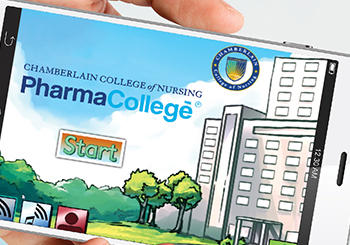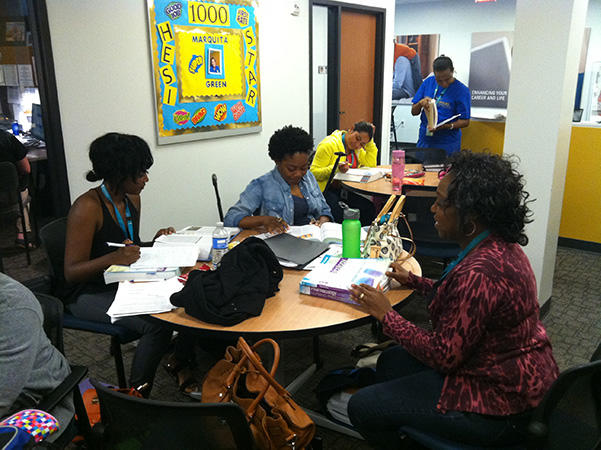Featured
Tags
Share
- Home / Blog / Campus News / Gaming Breaks Into Nursing Education
Gaming Breaks Into Nursing Education

Ask any nursing student to list the most challenging classes in nursing school and pharmacology is likely to be among them.
The course, which focuses on students learning drug facts, side effects and how to administer them, is traditionally taught like any other – students are exposed to facts and information via textbooks and lectures and then tasked with applying it in various scenarios.
But a modern approach has been taken at Chamberlain College of Nursing, where students are putting down the books and picking up tablets and laptops to engage in a different type of learning.
PharmaCollegē
Web-based gaming has been around for many years, but only recently has it been harnessed for educational purposes at a collegiate level. The basic premise remains the same: players interact with a game in order to complete levels, but their progress hinges on correctly answering questions or completing tasks as per their course material.
“Given the sometimes tricky nature of pharmacology subject matter, it seemed like the perfect opportunity to try a new way of engaging students,” said Leila McKinney, DNP, MSN, APRN, NP-C, director of the Engaged Learning Technologies department for DeVry Education Group, past president of Chamberlain’s Atlanta campus and self-professed lifelong gamer.
McKinney led the team that created PharmaCollegē – an educationally-oriented game that simulates patient care through check-ins, reviewing, dosing and administering medication orders, and patient observation and education. It also features pop-up questions and quizzes to prepare students for nursing licensure exams by enhancing their understanding of medication administration principles, incorporating more than 4,000 unique medication orders that represent over 300 drugs in 150 classifications.
“We created PharmaCollegē to allow student nurses to engage directly with their course material through game-based simulations,” said McKinney. “It gives students the opportunity to improve their foundational knowledge of pharmacology and approach to patient care, preparing them to meet increasingly more complex healthcare needs.”
It’s also a lot of fun. Just ask any of the students who’ve tried it.
“It’s a very fun and cute game,” said Shannon Durden, Chamberlain BSN student. “It reinforces what you already know, and helps you learn things you didn't.”
“I really enjoyed playing it,” added Krystal Ferrell, fellow BSN student. “It’s been helpful in learning pharmacology.”
The Gaming-Education Connection
Recognizing the need for this type of learning for today’s students has been the guiding force for McKinney ever since she first pitched the idea for PharmaCollegē back in 2012.
“When I was teaching, I used to create board games for my students. I always believed that learning through games was important. It connects students to the material in different and important ways.”
Games and education come together as part of an active learning approach. While games alone can’t replace traditional teaching methods, they can be a powerful education tool when combined with other exploratory and hands-on activities.
According to an article published in Scientific American late last year, testing fatigue, combined with more pervasive computer use in and out of the classroom and continued experimentation with games as learning tools, suggests that video games will play a significant role in the future of education.
Advocates of game-based learning in higher education cite the ability of digital games to teach and reinforce skills important for future jobs such as collaboration, problem-solving and communication.
With the gaming-education connection solidifying around the world, McKinney notes that PharmaCollegē won’t be Chamberlain’s last educational game. “PharmaCollegē has been a big win for us, and we want to build on that. A number of other games are in the works, including one to help students with medical calculations and another focused on nutrition.”
By Natalie Sobolewski
More from Campus News
Request More Information
To receive the Chamberlain University Program Guide, including associated career paths, please select a program of study.






